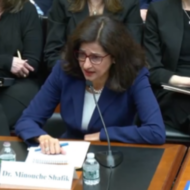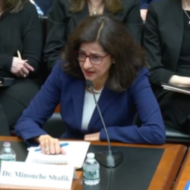
Columbia University Leaders Come Under Fire in Intense Congressional Antisemitism Hearing

The hearing is part of the House committee’s investigation into antisemitism on college campuses in the wake of Oct. 7.
By Andrew Bernard, JNS
Columbia University’s president, its two board co-chairs and a co-chair of its antisemitism taskforce testified before the House Committee on Education and the Workforce on Wednesday about Jew-hatred on campus since Hamas’s Oct. 7 attack.
Student groups and professors celebrated Hamas’s attack and have since held antisemitic and anti-Israel demonstrations at Columbia, which the U.S. Department of Education is investigating for potential civil-rights violations and which is the subject of a lawsuit alleging “virulently hostile” Jew-hatred.
Members of the House committed asked Minouche Shafik, Columbia’s president, about Joseph Massad, a tenured professor of modern Arab politics and intellectual history, who wrote an article on Oct. 8 describing the Hamas massacre as a “stunning victory” that was “awesome.”
“I am appalled by what he said,“ Shafik said. “He has been spoken to.”
Rep. Tim Walberg (R-Mich.) was incredulous that Massad continues to teach and that a “talking to” was the extent of his punishment.
“Spoken to?” Walberg said. “He’s been spoken to?”
Asked by the committee whether they would approve tenure for Massad if he was being considered today, Claire Shipman and David Greenwald, co-chairs of Columbia’s board of trustees, said they would not.
The hearing is part of the House committee’s investigation into antisemitism on college campuses in the wake of Oct. 7.
In December, it grilled the presidents of Harvard University, the University of Pennsylvania and the Massachusetts Institute of Technology about what actions they’ve taken to combat Jew-hatred.
The three university presidents all said at the time that calling for the genocide of Jews would not necessarily violate their university codes of conduct, claiming that it would depend on context.
The backlash from that hearing prompted Penn president Liz Magill to resign. Harvard president Claudine Gay resigned in January amid allegations that she had plagiarized much of her academic work.
Shafik, Shipman, Greenwald and David Schizer, co-chair of Columbia’s taskforce on antisemitism, said unanimously on Wednesday that calling for the genocide of Jews would violate Columbia’s code of conduct.
They were divided about how to characterize recent events on campus.
Rep. Ilhan Omar (D-Minn.) asked Shafik if she had seen protests against Jews on Columbia’s campus.
Shafik replied “No,” despite anti-Israel protests at Columbia that have included chants of “death to the Jews.”
Schizer, Shipman and Greenwald disagreed with Shafik, saying there have been anti-Jewish rallies on campus.
“There have been a number of incidents, especially one at our law school recently that the students were trying to call a ‘protest,’” Shipman said, using air quotes.
“But it was an event to harass admitted students who were Jewish, and it’s outrageous.”
Rep. Elise Stefanik (R-N.Y.) asked Shafik to clarify why she could not describe these events as anti-Jewish after her colleagues did so.
Why is it so hard for Columbia’s President Shafik to say anti-Jewish protests have occurred on Columbia’s campus?
Watch her exchange with @RepStefanik
pic.twitter.com/48Z9llg38K
— House Committee on Education & the Workforce (@EdWorkforceCmte) April 17, 2024
“The protest was not labeled as an ‘anti-Jewish protest,’” Shafik said. “Anti-Jewish things were said at protests, yes.”
Shafik was also asked about Mohamed Abdou, a visiting professor in modern Arab studies, whom the Columbia website calls a “North African-Egyptian Muslim anarchist interdisciplinary activist-scholar of indigenous, black, critical race and Islamic studies, as well as gender, sexuality, abolition and decolonization with extensive fieldwork experience in the Middle East-North Africa, Asia and Turtle Island.” (Turtle Island is a name for North America derived from Native American folklore.)
On Oct. 11, Abdou posted on Facebook, “I’m with the muqawamah (the resistance) be it Hamas and Hezbollah and Islamic Jihad.” Despite that post, which remains live, Columbia hired Abdou in 2024 and he taught the course “Decolonial-queerness and abolition.”
“He will never work at Columbia again,” Shafik said. “He’s currently not employed by Columbia. He is grading his students’ papers and will never teach at Columbia again.”
Later in the hearing, Stefanik appeared to point to Abdou’s most recent social media activity to contradict Shafik.
“Just to let you know, Mr. Abdou is not grading papers right now. He’s on campus at the unsanctioned, anti-Israel, antisemitic event that is being supported by pro-Hamas activists on campus,” Stefanik said.
Images from that anti-Israel protest show that students set up a “Gaza solidarity encampment” of tents and another tent labeled a “liberated zone.”
In her testimony before the committee, Shafik also said that she did not condone a 2022 glossary of terms that was previously hosted on the Columbia School of Social Work’s website that included the word “Ashkenormativity.”
The document defines that term as “a system of oppression that favors white Jewish folx, based on the assumption that all Jewish folx are Ashkenazi, or from Western Europe.”
Rep. Jim Banks (R-Ind.) asked Shafik why the students spelled “folks” with an “X” throughout the guide.
“They don’t know how to spell,” Shafik suggested.
Although the Columbia president’s statement drew some laughs, some activists spell certain words with an “X” to convey gender inclusivity.
Some members of the committee thanked the Columbia leaders for giving better answers than the presidents of Harvard, Penn and MIT did. But Stefanik issued a statement after the hearing comparing the responses at Wednesday’s hearing and those in December.
“Today’s hearing of Columbia University president and board members epitomizes the failed leadership on ‘elite’ college campuses to combat antisemitism and protect Jewish students,” the New York Republican stated.
Rep. Virginia Foxx (R-N.C.), the chairwoman of the committee, said in her opening remarks that Columbia and other elite U.S. colleges are risking permanent reputational damage in failing to address campus antisemitism.
“The raw, visceral reaction of the nation to the unveiling of antisemitism at so-called elite institutions is indicative of the growing disconnect between the people and those universities,” Foxx said. “This is evinced by a general loss of public trust and faith in postsecondary education.”
“We are headed down a dark path if we cannot agree on basic shared moral values, such as the implication of calls for genocide,” she added. “Bright lines must be drawn before the reputational damage to American universities is endemic and intractable.”
Stefanik said after the hearing that Columbia’s leaders had acted arrogantly.
“Interestingly, during a break, the witnesses were overheard discussing how well they thought their testimony was going for Columbia,” she said. “This arrogance is eerily reminiscent to the previous three university presidents, who believed walking out of the hearing that their testimony was acceptable.”
“Columbia is in for a reckoning of accountability,” Stefanik added.
Send Passover Packages to Needy Israeli Soldiers – Bring Them Joy!
We are honored to thank the young men and women of the IDF who risk their lives every day to protect the citizens of Israel. Since October 7th, soldiers have been on the battlefield for months – many are hoping to come home for Passover.
Join us in sending Passover food packages (and personal notes) to Israeli soldiers and their families.
Many soldiers spend the Passover holiday with needy families back home. The soldiers greatly appreciate your love and concern. Bring them Passover joy!
CLICK HERE TO SEND YOUR PACKAGE AND NOTE TO ISRAELI SOLDIERS!
The post Columbia University Leaders Come Under Fire in Intense Congressional Antisemitism Hearing first appeared on United with Israel.
United with Israel
